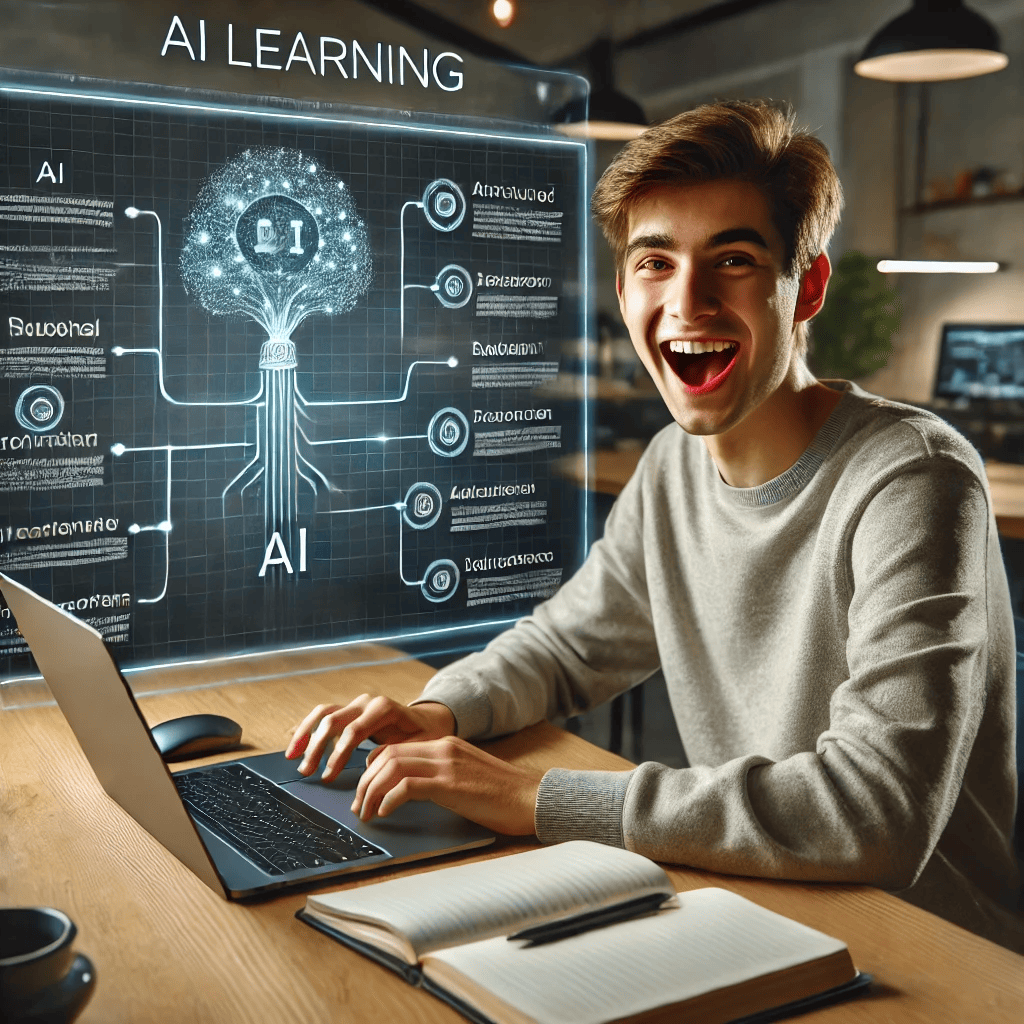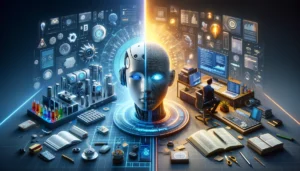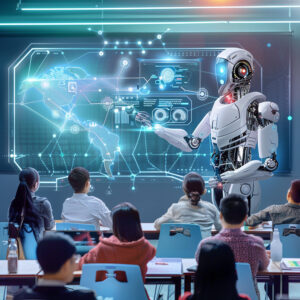How to Learn AI for Free in 2025 (Step-by-Step Guide)
Discovering how to learn AI for free in 2025 has become easier than ever before, with countless resources and tools available at your fingertips. The technological landscape has transformed dramatically, making artificial intelligence literacy not just a luxury but a fundamental skill for the modern workforce. The World Economic Forum’s 2023 survey highlighted AI literacy as one of the most crucial employee skills, emphasizing its growing importance across all industries and sectors. As AI systems become more sophisticated and integrated into daily operations, the ability to understand and work with AI technologies has become as essential as basic computer literacy was in the previous decade. This comprehensive guide will walk you through a structured approach to mastering AI without spending a penny, leveraging the best free resources available in 2025.
We strongly recommend that you check out our guide on how to take advantage of AI in today’s passive income economy.
Table of Contents
Understanding the Foundation: Python Programming Skills
The journey to learn AI for free in 2025 begins with mastering Python programming. AI engineers spend considerable time instructing machines, and Python serves as the primary communication bridge between human intent and machine execution. The Python ecosystem has evolved significantly, offering an unprecedented level of support for AI development. Modern AI-assisted integrated development environments (IDEs) now function as personal coding tutors, providing real-time guidance and feedback as you learn. The integration of AI-powered code completion and suggestion systems has revolutionized the learning process, making it possible to receive instant feedback on coding practices and learn from real-world examples as you write code.
Getting Started with Python Basics
The Python programming landscape in 2025 offers numerous free resources for beginners. The official Python documentation remains an invaluable starting point, providing detailed instructions for installation and basic programming concepts. The documentation includes comprehensive tutorials, from basic syntax to advanced programming patterns. Community-maintained resources have expanded significantly, offering interactive learning experiences that adapt to your skill level and learning pace. Modern Python learning platforms now incorporate gamification elements and real-world project scenarios, making the learning process more engaging and practical. These platforms often include features like peer review systems and community challenges that help reinforce learning through practical application.
Essential Python Libraries for AI Development
The AI ecosystem in Python has grown exponentially, with libraries like Pandas, Scikit-learn, Transformers, and LangChain forming the backbone of modern AI development. Pandas has evolved to handle increasingly complex data structures, with optimizations that make it possible to process massive datasets efficiently. Scikit-learn continues to be the go-to library for traditional machine learning, offering implementations of numerous algorithms with clear documentation and examples. The Transformers library has revolutionized access to pre-trained models, providing easy-to-use interfaces for working with state-of-the-art language models. LangChain has emerged as a crucial tool for developing AI agents capable of complex task orchestration, enabling developers to create sophisticated AI applications with relatively simple code.
Advanced Python Concepts for AI
Beyond the basics, modern AI development requires understanding advanced Python concepts such as decorators, context managers, and asynchronous programming. These features are essential for building efficient AI systems that can handle multiple tasks simultaneously and manage resources effectively. The Python community has developed numerous free resources specifically focused on these advanced concepts, including interactive tutorials and real-world examples that demonstrate their practical applications in AI development.
Mastering Core AI Disciplines
To learn AI for free in 2025 effectively, you need to focus on four fundamental disciplines: linear algebra, probability theory, machine learning models, and deep learning. These core areas form the foundation of all advanced AI applications, from natural language processing to computer vision systems. The integration of these disciplines has become increasingly important as AI systems grow more sophisticated, requiring developers to understand how these different areas interact and complement each other.
Mathematics for AI
The Imperial College London specialization in mathematics for machine learning stands out as an exceptional resource for understanding the mathematical foundations of AI. The course specifically focuses on linear algebra applications in machine learning, making abstract concepts tangible through practical examples. Linear algebra concepts like eigenvalues, singular value decomposition, and matrix operations are presented in the context of real machine learning applications, helping students understand their practical significance. The course also covers optimization techniques essential for training machine learning models, providing a solid foundation for understanding how modern AI systems learn and improve their performance.
Probability Theory and Statistics
Understanding probability theory and statistics is crucial for working with modern AI systems. These fields provide the theoretical framework for understanding how AI models make decisions under uncertainty and how they learn from data. Free courses now cover advanced topics like Bayesian inference, maximum likelihood estimation, and information theory, all essential concepts for developing robust AI systems. The practical applications of these concepts are demonstrated through real-world examples, helping students understand how theoretical principles translate into actual AI applications.
Machine Learning Fundamentals
Google’s machine learning engineering path provides hands-on experience in applying theoretical concepts to real-world problems. The course covers model development, evaluation metrics, and deployment strategies, bridging the gap between theory and practice. Students learn about different types of machine learning algorithms, from simple linear regression to complex ensemble methods, understanding when and how to apply each technique. The course also covers important practical considerations like data preprocessing, feature engineering, and model validation techniques.
Deep Learning Specialization
Deep learning has become increasingly central to modern AI applications. Free courses now cover advanced topics like convolutional neural networks, recurrent neural networks, and transformer architectures. These courses include practical exercises using popular deep learning frameworks like PyTorch and TensorFlow, helping students understand how to implement and train complex neural networks. The curriculum also covers important concepts like transfer learning and fine-tuning, which are essential for developing practical AI applications with limited computational resources.
Joining the AI Community
The AI community has become increasingly accessible, with platforms like Uther AI fostering open discussion and collaboration. Their Discord server serves as a hub for AI enthusiasts and professionals alike, discussing everything from recent research papers to practical implementation challenges. The community aspect of AI learning has become increasingly important, with many developers sharing their experiences and helping others overcome common challenges. These communities often organize hackathons, coding challenges, and collaborative projects that provide valuable hands-on experience.
Online Learning Communities
Beyond traditional forums, online learning communities have evolved to provide structured learning paths and peer support systems. These communities often organize study groups focused on specific topics or courses, allowing learners to progress together and support each other. Many communities also maintain wikis and knowledge bases that collect practical tips, troubleshooting guides, and best practices from experienced developers.
Research and Development Communities
The research side of AI has become more accessible through platforms like Papers with Code, which connects academic research with practical implementations. These platforms make it easier for beginners to understand and experiment with cutting-edge AI techniques. The Hugging Face community has grown into a comprehensive resource for working with transformer models, offering not just code but also detailed explanations and tutorials.
Practical Application and Project Development
Learning AI theory without practical application is like trying to learn swimming without water. Choosing the right project can accelerate your learning journey significantly. When selecting a project, focus on creating value, whether for personal use, community benefit, or potential customers. This approach helps develop not just technical skills but also the ability to translate AI capabilities into practical solutions. The key is to start with manageable projects that align with your current skill level while providing opportunities for growth and learning.
Project Selection and Planning
Successful AI projects require careful planning and a clear understanding of objectives. When choosing a project, consider factors like data availability, computational requirements, and potential impact. Start with projects that have well-defined scope and clear success criteria. Many successful AI practitioners recommend beginning with projects that solve personal problems or automate routine tasks, as these provide immediate value and motivation to complete the project.
Development Environments and Tools
While free environments like Google Colab provide basic functionality, professional development requires more robust tools. Modern IDEs offer integrated terminal access, debugging capabilities, and AI-assisted coding features. These tools help manage complex projects involving multiple Python modules and deep learning models effectively. The development environment should support version control, package management, and efficient debugging workflows. Many cloud platforms now offer free tiers that provide access to GPU resources, making it possible to experiment with deep learning models without significant investment.
Continuous Learning and Growth
The field of AI evolves rapidly, making continuous learning essential for staying relevant. A strategic approach to staying updated involves subscribing to curated AI newsletters and following key researchers and practitioners on social media platforms. This combination provides both deep insights and quick updates on the latest developments in the field. The key is to develop a sustainable learning routine that allows you to stay current without becoming overwhelmed by the constant flow of new information.
Building a Learning Routine
Establishing a regular learning routine helps maintain steady progress in your AI journey. Dedicated time slots for theoretical study, practical coding, and community engagement ensures balanced growth. Many successful AI practitioners recommend setting aside specific times for different aspects of learning, such as Friday mornings for catching up with newsletters and community discussions. The routine should also include regular project work and experimentation with new techniques and tools.
Professional Development and Networking
As you progress in your AI learning journey, professional networking becomes increasingly important. Many free online events, webinars, and conferences provide opportunities to connect with other professionals in the field. These connections can lead to collaborative projects, mentorship opportunities, and insights into industry trends and best practices. Participating in open-source projects is another excellent way to gain experience and build professional relationships.
The journey to learn AI for free in 2025 requires dedication, strategic planning, and consistent effort. By following this comprehensive guide and leveraging the abundant free resources available, you can build a strong foundation in AI development. Remember that the field continues to evolve, making continuous learning and community engagement essential parts of your journey. Start your AI learning adventure today, and become part of the growing community of AI practitioners shaping the future of technology.

We strongly recommend that you check out our guide on how to take advantage of AI in today’s passive income economy.




